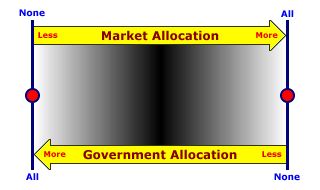
|
|
SLOPE, LONG-RUN AGGREGATE SUPPLY CURVE: The long-run aggregate supply (LRAS) curve is a vertical line with an infinite slope, reflecting the independent relation between the price level and aggregate real production. A higher price level is associated with the same real production as a lower price level. And this real production is that produced when resources are fully employed, that is, full-employment production. Real production is unaffected by the price level because prices are flexible in the long run. Long-run price flexibility ensures that ALL markets (product, financial, and resource) are in equilibrium.
Visit the GLOSS*arama
|
|


|

|
                           PURE COMMAND ECONOMY: An economy, or economic system, that relies exclusively on governments to allocate resources and to answer all three questions of allocation. This theoretical ideal has no markets, government makes all allocation decisions. Then contrasting theoretical ideal is a pure market economy in which markets make all allocation decisions. | Economic Systems |  |
A pure command economy is a theoretical extreme on the spectrum of economic systems that does not actually exist in the real world. It does, however, provide a benchmark that can be used for comparison with real world economic systems. In pure command economies, governments force all allocation through involuntary taxes, laws, restrictions, and regulations. Governments set forth the laws and rules. If folks do not follow the rules, then they are punished. Governments can punish those who do not follow the rules because... well... because they are the governments. Given a choice, most humans probably would rather NOT pay taxes or have their cars safety inspected. They follow government rules because they have to, because that IS the law. The real world embodiment of a pure command economy is termed a command economy. The communistic/socialist economies of China and the former Soviet Union are primary examples of command economies. While, in theory, resource allocation could be undertaken exclusively through markets or governments, in the real world, all economies rely on a mix of both markets and governments for allocation decisions, what is termed a mixed economy.

Recommended Citation:PURE COMMAND ECONOMY, AmosWEB Encyclonomic WEB*pedia, http://www.AmosWEB.com, AmosWEB LLC, 2000-2024. [Accessed: May 2, 2024].
Check Out These Related Terms... | | | | | | | |
Or For A Little Background... | | | | |
And For Further Study... | | | | | | |
Search Again?
Back to the WEB*pedia
|



|

|
BEIGE MUNDORTLE
[What's This?]
Today, you are likely to spend a great deal of time at a dollar discount store seeking to buy either a birthday gift for your grandfather or a pleather CD case. Be on the lookout for bottles of barbeque sauce that act TOO innocent.
Your Complete Scope
This isn't me! What am I?
|

|
|
The first paper currency used in North America was pasteboard playing cards "temporarily" authorized as money by the colonial governor of French Canada, awaiting "real money" from France.
|

|
|
"Leadership is based on inspiration, not domination; on cooperation, not intimidation. " -- William A. Ward
|

|
APP
Average Physical Product
|

|
|
Tell us what you think about AmosWEB. Like what you see? Have suggestions for improvements? Let us know. Click the User Feedback link.
User Feedback
|


|


